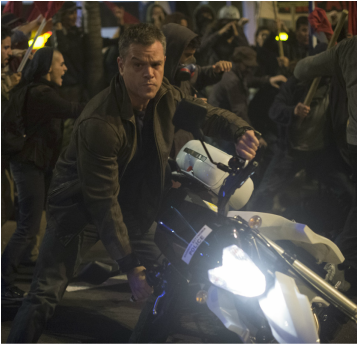Review:
"Jason Bourne"

Release Date: July 29, 2016
Rating: PG-13 Running Time: 123 minutes The Jason Bourne franchise already received an unnecessary extension courtesy of 2012’s The Bourne Legacy, the exposition-heavy sequel that botched its bid to establish Jeremy Renner as Matt Damon’s “chems”-enhanced successor. Now comes Jason Bourne, which sees the return of both Damon and his Bourne Supremacy and Bourne Ultimatum director Paul Greengrass. The result is another superfluous sequel, one that is built on the contrivance that there is a personal connection between the in-hiding ex-CIA assassin and the Treadstone program that turned him into a one-man killing machine. So much for The Bourne Ultimatum bringing Bourne’s story full circle. This time, though, Bourne’s recovered memories don’t drive the narrative—instead, he’s working from information that’s fed to him from both reliable and dubious sources. By just handing over to Bourne the information he needs, Jason Bourne instantly becomes a less intriguing prospect than its predecessors. What made this franchise work in the past is the journey the uncompromising Bourne undertook to overcome his amnesia and piece together the life he led before and after his Treadstone recruitment. In Jason Bourne, the dots are too easy to connect based on the little information Bourne needs to track down his quarry. Bourne is brought out of hiding by his former Treadstone contact Nicky Parsons (the returning Julia Stiles). All hell breaks loose after Parsons informs Bourne that Treadstone targeted him for recruitment for reasons that are best not to spoil. After surviving an attempt on his life by Vincent Cassel’s CIA assassin, who’s known only as “The Asset,” Bourne vows to bring down the man behind Treadstone, CIA director Robert Dewey (Tommy Lee Jones). Alicia Vikander joins the franchise as Dewey’s protégé Heather Lee, but for all but the last five minutes of Jason Bourne, her performance and the actions of her ambitious CIA agent are as nondescript as her character’s name. This is too much of a throwaway role for the recent Oscar winner, but at least she can take comfort knowing that she could skip any future Bourne sequel if she wants because Lee could easily be written out of the franchise. The disinterested Jones employs his trademark hangdog look to denote that he couldn’t care less whether he succeeds in Jason Bourne where the likes of Chris Cooper, Brian Cox, and David Strathairn failed in previous installments. Damon brings his usual intensity to his signature role, but he’s not given much to do by Greengrass and co-screenwriter Christopher Rouse beyond throwing punches, shooting guns, and engaging in car chases. Damon’s lack of motivation to do anything else in Jason Bourne is understandable given the flimsy excuse to draw Bourne back into the crossfire and the absence of the internal struggle that fueled Bourne in Damon’s first three outings. Relying too heavily on his agitated camerawork to lure us into the action, Greengrass fails to find the necessary pacing for a Bourne sequel that places too much emphasis on gunplay and fistfights at the expense of getting into the head of its psychologically and emotionally damaged protagonist—which was what initially separated the Bourne films from spy thrillers and franchises. He also bookends Jason Bourne with action sequences that are executed with varying degrees of success. He opens Jason Bourne with a chase held during a riot in Athens, but he doesn’t use the ensuing mayhem to full advantage. He closes Jason Bourne with perhaps the best car chase in the franchise’s history, one that requires littering the Las Vegas Strip with more wrecked vehicles than you would find in a junkyard. But it doesn’t matter how much death and destruction Bourne causes as he travels across the world in the name of vengeance. Jason Bourne never justifies the continued existence of a franchise that came to its natural and satisfying ending with The Bourne Ultimatum. Robert Sims Aired: July 28, 2016 Web site: http://www.jasonbournemovie.com |
|
